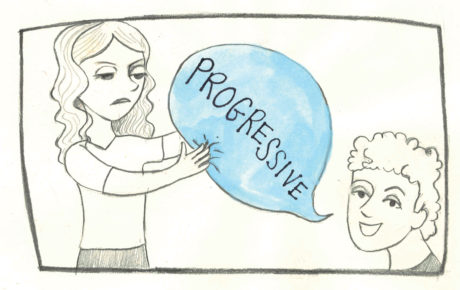Much has been written about the current crisis of communication in America, the supposed difficulty of broaching difficult topics and, once those topics have been broached, the difficulty of maintaining a civil tone. Many explanations for this phenomenon have been offered. We talk past each other. We internally vilify those with opposing views. We come to the conversation not to be convinced, but to argue. These are all part of the problem, but I’d propose another underlying issue that plagues even good faith engagement.
This is the issue of terminology and semantics. Different words and phrases have different meanings and connotations for different religious, political and cultural groups. Failure to deal with these differences across groups makes coherent discussion much more difficult.
For example, in the course of a good and lengthy discussion about God that I recently had with a Christian, I began to talk about “˜natural laws.’ To me, those words meant the laws of physics. To him, those words referred to the way humans are supposed to live their lives based upon the characteristics given them by God. Once we resolved the inconsistency, we were able to make good progress. More broadly, consider how progressive talk of power structures falls upon conservative ears and how conservative talk of Judeo-Christian values sounds to progressive ears.
Failing to speak the language of someone you’re trying to convince makes convincing that person substantially harder. Indeed, phrasing concepts and ideas in ways that different audiences can understand is key, as scientific communicators know all too well. The problem is that in the course of trying to speak the language of those they disagree with, many people fall victim to what I’ll call “˜terminological appropriation.’
By this I mean that people will take the terminology of the other side and use it in debates as a cudgel or a source of facile buzzwords to make easy, shallow points. I saw a prime example of this at a recent social co-hosted by Trinity Progressives and Tigers for Liberty. I thought that, in general, the social was an excellent idea. People were respectful and there were almost two hours of polite exchange of viewpoints. However, at one point, a member of Trinity Progressives was discussing immigration with a member of Tigers for Liberty, who happened to be Christian. The argument of the Trinity Progressives member essentially boiled down to: Jesus says we should love everyone, so why should there be any restrictions on immigration?
Now, as a non-believing Jew, there’s little that is less immediately interesting to me than what Jesus did or didn’t say. However, it was pretty obvious to me that the Trinity Progressives member had appropriated the idea of Jesus that she knew was important to many conservatives and was using a simplistic interpretation of the gospel as a cudgel to beat a conservative opponent into agreement with an impractical policy position.
This type of appropriation is widespread. Witness the endless parade of liberals and democratic politicians ham-handedly inserting words and phrases like “˜patriotism’ or “˜honorable conservative’ into their press releases and tweets. Like bad CGI, these attempts to warp the terminology of the other side fall into the uncanny valley of political persuasion, where the insincerity is uncomfortably obvious.

Of course, conservatives do this too. Consider the article written by Manfred Wendt in last week’s issue of the Trinitonian, in which he rightfully complains about the nanny-state tendencies of the Trinity administration. In this piece, he shoehorns in the term “˜progressive’ as synonymous with this overbearing attitude, a clear rhetorical attempt to get progressive Trinity students to reconsider their preference for stronger government regulation at a national level. However, Wendt’s shallow appropriation of the term so thoroughly tangles the subtleties and variations of progressive ideology, and its overlap with notions of liberty, that his argument devolves to a straw man.
It’s useful and wise to speak to those we disagree with using terminology they understand. However, requisite with such an approach comes an obligation to take the time and effort to really understand the intellectual underpinnings of that terminology. Not only will this facilitate better communication, it obliges oneself to confront the strongest version of an opponent’s beliefs, instead of the lowest hanging rhetorical fruit.




